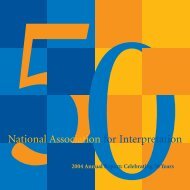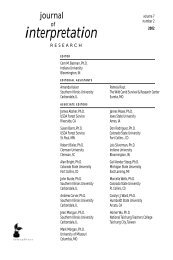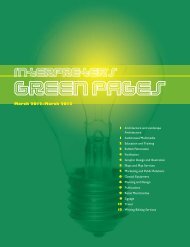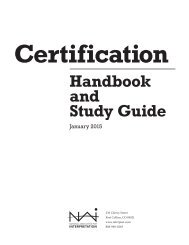interpretation
Volume 15, Number 1 - National Association for Interpretation
Volume 15, Number 1 - National Association for Interpretation
Create successful ePaper yourself
Turn your PDF publications into a flip-book with our unique Google optimized e-Paper software.
m a n d y h a r r i s o n , s a r a h b a n k s , j o y j a m e s<br />
training. Experience in this case was measured by increase in interest in and knowledge<br />
of the river environment pre- and post-rafting trip. Regardless of guide training, all<br />
clients’ interest in and knowledge of the environment showed significant increase after<br />
the rafting experience. However, clients of guides who had participated in the training<br />
had significantly higher increases than clients of guides who did not participate in the<br />
training. This study indicates that river guide participation in <strong>interpretation</strong> training<br />
can influence the client’s knowledge and interest regarding the environment. This<br />
study indicates that the embedding of interpretive messages in settings that are not<br />
traditionally <strong>interpretation</strong> platforms can encourage interest in the natural environment<br />
in a wider population.<br />
Context<br />
This study assesses the impact of <strong>interpretation</strong> training on a river guide’s client<br />
knowledge of and interest in the river environment. River guide <strong>interpretation</strong> training,<br />
in this instance, was through a Headwaters Institute (HWI) seminar. The Headwaters<br />
Institute is a nonprofit organization with a mission “to provide education that inspires<br />
individuals and communities to care for and connect with their watershed” (Hicks,<br />
2006). The institute provides support to educators that host environmental education/<br />
<strong>interpretation</strong> seminars across North America. These seminars are largely targeted<br />
towards whitewater raft guides, but fishing guides and environmental educators are<br />
also encouraged to be seminar participants. The two main objectives of a HWI seminar<br />
are (1) to educate and inform participants about the natural history and ecosystem in<br />
which they work and (2) to give them support to act as interpreters of this information.<br />
The ultimate intent is that they will then pass this information and ideally pass a better<br />
appreciation of the river environment on to their clients.<br />
Previous research (Harrison & Banks, 2008) indicates that participants in a<br />
Headwaters Institute seminar show a significant (p< .005) increase in their perceptions<br />
of self-efficacy regarding both their ability to teach specific environmental information<br />
as well as their ability to motivate their clients to learn about the river environment. This<br />
research investigates the validity of those efficacy perceptions.<br />
Study Purpose<br />
The purpose of this study was to evaluate the effectiveness of river guide participation<br />
in a Headwater’s Institute Seminar in increasing client’s knowledge of and interest in the<br />
river environment.<br />
Specifically, the following hypotheses were examined:<br />
Ho 1<br />
: There is no difference in pre- and post-rafting experience test scores of river<br />
guide client knowledge of and interest in the river environment.<br />
Ho 2<br />
: There is no difference in scores of river guide client knowledge of and interest<br />
in the river environment between groups who rafted with HWI trained guides<br />
when compared to non-HWI trained guides.<br />
Background<br />
Tourism is one of the largest and fastest-growing industries in the world, particularly<br />
nature-based tourism. One unfortunate by-product with this increase interest in<br />
nature-based tourism is environmental impact. The management and protection of<br />
40 j o u r n a l o f i n t e r p r e t a t i o n r e s e a r c h












